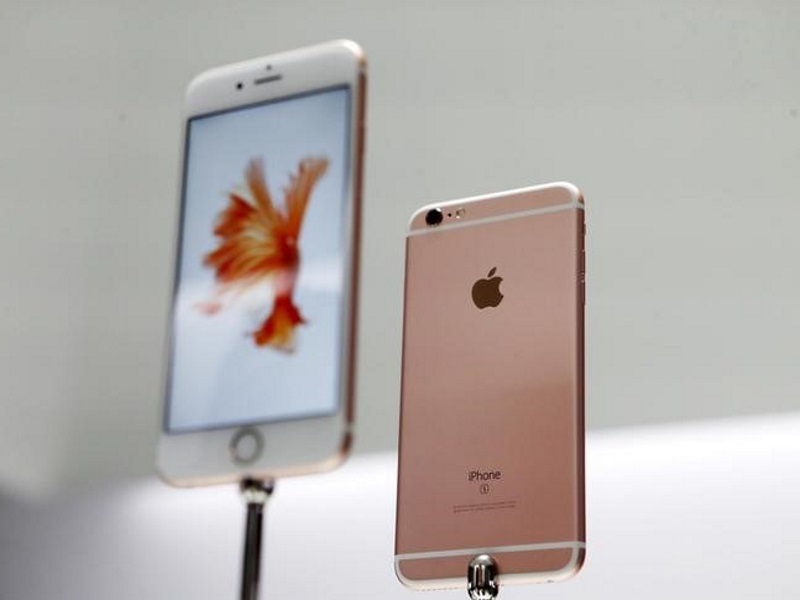- Home
- Mobiles
- Mobiles Features
- An iPhone Made in America? Not That Simple
An iPhone Made in America? Not That Simple

As US President Donald Trump pushes hard for goods to be "made in America," how realistic is it to expect Apple to stop manufacturing its iconic devices in China?
The freshly installed president vowed while campaigning that he would force Apple to bring production to US soil.
Yet, as other big companies have sought to appease the new administration with promises of jobs or investments in the United States, Apple has stayed low-profile.
Apple, Google, Other Tech Firms Protest US President Donald Trump's Immigration Order
Major Apple contractor Foxconn this month confirmed that it is considering a $7 billion investment to make flat panels in the US in a joint project with Japan's SoftBank.
"I have discussed with my major clients about going to (the US) and they are also willing to invest, including Apple," Foxconn founder Terry Gou told reporters in Taipei.
Taiwan-based Foxconn has given no details, and Apple declined to comment.
Global Equities Research analyst Trip Chowdhry believed that moving manufacturing to the US, where many customers are, was more of a common sense move than a political one.
"You need to manufacture local products in local markets," Chowdhry reasoned.
Making things locally gives better control of distribution networks and lets manufacturers customize goods for local markets, the analyst noted.
Logistics puzzle
Whether politically motivated or not, Apple is not in the same position as automakers which relocated US factories overseas to cut costs, according to IHS manufacturing processes chief analyst Dan Panzica. Apple never moved jobs offshore, it created them there.
"The Apple jobs were never here," Panzica said.
"The entire supply chain grew in China."
Apple benefits in Asia from a network that goes beyond subcontractors assembling smartphones, tablets or laptops. The California-based firm relies on a dense ecosystem of companies that make components and spare parts for its devices as well.
China also offers sources of important raw materials, along with cheap, flexible and abundant labor to keep iPhone assembly lines cranking along.
It would be "very hard to replicate" that situation with US workers without using "more robotics and less workforce," undermining the political aim of creating jobs here, according to Endpoint Technologies analyst Roger Kay.
Exacerbating the challenge, "it makes no sense to make phones here if you have to ship all the components from China," said technology analyst Jack Gold of J. Gold Associates.
Sacrifice profit or price
The MIT Technology Review in June considered several scenarios, from simply bringing assembly to the US to simultaneously shifting the manufacture of parts here.
The Review estimated the extra manufacturing cost of an iPhone 6S Plus at $30 to $100 as a result of those moves.
It is difficult to imagine that Apple would risk its status as the world's most profitable company to absorb such a hike in manufacturing costs.
"Apple will never lower its margins on its flagship product, the iPhone," said Ovum consumer technologies analyst Ronan de Renesse.
Apple is under pressure from investors to keep its high margins, and already faces slowing growth of iPhone sales.
So, would US consumers put their money where the political talk is and pay more for iPhones stamped "Made in the USA"?
Not all analysts were convinced.
It was seen as more likely that Apple would make a symbolic move to appease Washington, such as investing more in making Mac Pro computers here, or in a facility for higher-priced, limited-edition devices such as an "anniversary edition iPhone" to mark the handset's 10th birthday this year.
"I would be very surprised to see a major production shift to the US," Gold said while discussing Apple.
Carrots or sticks
Breaking the US technology star's successful business model should be out of the question for the Trump administration, and there is likely to be a compromise such as "financial incentives," according to Ovum analyst de Renesse.
Foxconn is already trying to get US states to woo it with grants of land, cheap energy, or tax breaks.
Apple could seek tax amnesty for the $200 billion (roughly Rs. 13,61,377 crores) or so in profits it keeps overseas in exchange for increasing local manufacturing.
The economic equation would change if Trump went on the offensive by imposing heavy customs duties on Chinese imports.
Given Apple's dependencies on partners in China, and its keen desire to gain traction in that market, Apple could find itself an early casualty in a US trade battle with Beijing.
Catch the latest from the Consumer Electronics Show on Gadgets 360, at our CES 2026 hub.
Related Stories
- Samsung Galaxy Unpacked 2025
- ChatGPT
- Redmi Note 14 Pro+
- iPhone 16
- Apple Vision Pro
- Oneplus 12
- OnePlus Nord CE 3 Lite 5G
- iPhone 13
- Xiaomi 14 Pro
- Oppo Find N3
- Tecno Spark Go (2023)
- Realme V30
- Best Phones Under 25000
- Samsung Galaxy S24 Series
- Cryptocurrency
- iQoo 12
- Samsung Galaxy S24 Ultra
- Giottus
- Samsung Galaxy Z Flip 5
- Apple 'Scary Fast'
- Housefull 5
- GoPro Hero 12 Black Review
- Invincible Season 2
- JioGlass
- HD Ready TV
- Laptop Under 50000
- Smartwatch Under 10000
- Latest Mobile Phones
- Compare Phones
- Vivo Y500i
- OnePlus Turbo 6V
- OnePlus Turbo 6
- Itel Zeno 20 Max
- OPPO Reno 15 Pro Mini 5G
- Poco M8 Pro 5G
- Motorola Signature
- Vivo Y50e 5G
- Lenovo Yoga Slim 7x (2025)
- Lenovo Yoga Slim 7a
- Realme Pad 3
- OPPO Pad Air 5
- Xiaomi Watch 5
- Huawei Watch 10th Anniversary Edition
- Acerpure Nitro Z Series 100-inch QLED TV
- Samsung 43 Inch LED Ultra HD (4K) Smart TV (UA43UE81AFULXL)
- Asus ROG Ally
- Nintendo Switch Lite
- Haier 1.6 Ton 5 Star Inverter Split AC (HSU19G-MZAID5BN-INV)
- Haier 1.6 Ton 5 Star Inverter Split AC (HSU19G-MZAIM5BN-INV)

















